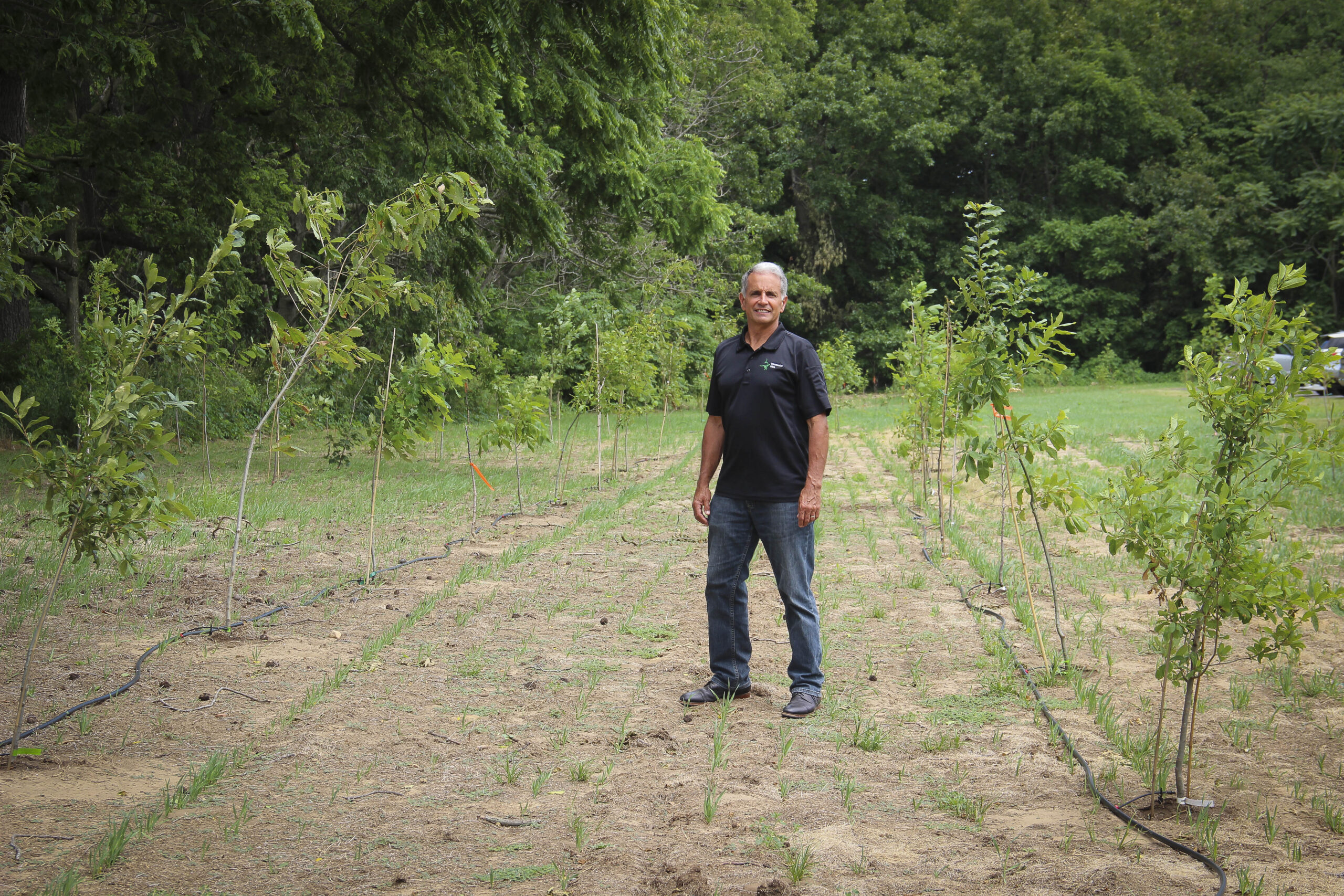In what way does your organization care for the land it inhabits? How does it offset its carbon footprint? These are the questions that Steve Thomas helps organizations, like yours, answer daily.
Steve is the U.S. Director of Mennonite Men, an organization existing under the umbrella of Mennonite Church USA (MC USA) and Mennonite Church Canada (MC Canada). Their mission is to engage men to grow, give, and serve as followers of Jesus. Mennonite Men carries out this mission in many ways, through initiatives like JoinHands and JoinMen, but the newest of their programming is JoinTrees. The goal of this program is to plant one million trees in ten years, and Steve thinks that goal is modest.
Walking along an uneven path, still sparse as spring blooms have yet to discover the rare April sunshine, Steve Thomas points out the many different trees inhabiting the wooded property of Pathways Retreat. Steve lives in a two-story house adjoining the property’s retreat center.
We arrive at a small clearing where two green lawn chairs welcome us.

“We’re losing tree and forest cover at a rate of 11.6 million acres per year.”
Steve Thomas
“We’re losing tree and forest cover at a rate of 11.6 million acres per year,” Steve tells me. Steve is a certified arborist, has a certificate in urban forestry, and is a retired Mennonite pastor. His passion, made clear by the Lorax figurine that sits atop his desk, is for the trees.
Contacted by a Mennonite connection working in Nairobi, Africa, a request was made to form an “army of tree planters.” Steve said that an “army” wasn’t really his style, but soon after, another request for a similar concept was divulged and the tug to engage change was pulling strong. Out of his passion for trees, and the vested interest of others, the JoinTrees project was formed. The goal, Steve tells me, is to plant one million trees by 2030.
Now, just three years into the project, JoinTrees has planted just under 300,000 trees. “We thought our primary focus would be tree planting projects in the US and Canada,” said Steve, “as it turns out the vast majority of our projects are in the global south.” Which, according to him, is a very good thing. The advantage of tree planting in these areas is the longer growing seasons, which means a quicker return on investment for the communities who harvest the fruits and nuts from them. “It has the co-benefit of supporting vulnerable communities that are suffering climate impacts. A lot of the trees being planted in Central America and Africa also provide a source of income for these communities,” Steve tells me. “[It] provides a direct benefit to support the livelihood of people.”
An unexpected task for this project, Steve says, was the planting of trees to be cut down for firewood. “I saw that double take,” Steve points out as my eyes widen at the thought. Steve explains that many communities don’t have access to gas or electricity, so they go into intact forest systems to get their charcoal. But the designation of certain trees as being intended for charcoal means that the trees providing fruits, nuts, and other needed resources are being preserved. The kind of trees being planted for the intended use as firewood are able to replace themselves, not something that all tree species can do. “The trees will regrow sprouts rapidly. That one tree that you’ve planted will continue growing over time, so it’s not that you’re killing it with a cut – it will keep growing and continuing to generate,” says Steve.
While JoinTrees has successfully planted many trees these past three years, funding is the biggest challenge the project faces. Although the initiative exists with the support of Mennonite Men, JoinTrees is funded solely through individual and business contributions, and for Steve, asking for money is especially uncomfortable. “I was a pastor for 33 years and typically other people in the congregation were asking for funding while I focused on the ministry. So now asking for money to fund our projects is challenging for me.”
Despite the challenge, Steve is still confident in the success of the project. Support from individuals, businesses, and congregations has been an asset, and while there may be some lack of funding (for now), there is no lack of interest. “We just approved 11 new projects to plant a total of 121,000 trees, which is very exciting,” Steve remarks.
Caring for God’s creation is the ultimate motivation for this initiative – not just for now, but for future generations. Planting and tending to the trees to ensure their future as well as ours. “We are planting trees for the future,” Says Steve, “to make sure that they have a future.”
You can get involved in JoinTrees by visiting the Mennonite Men website to explore options to devote land and plant trees, help with planting and care for trees, provide financial support, and access information on how to receive grants for tree planting.
